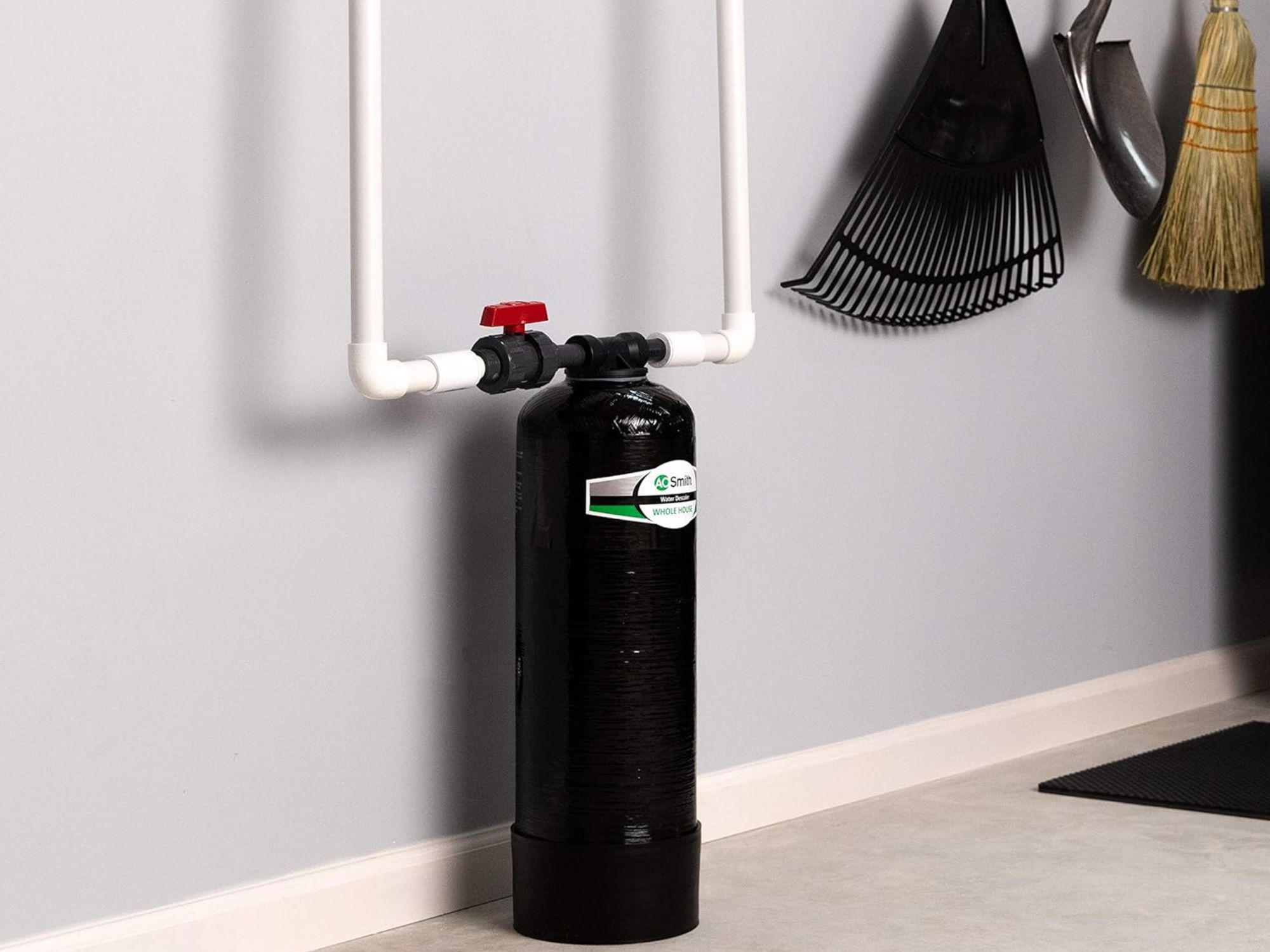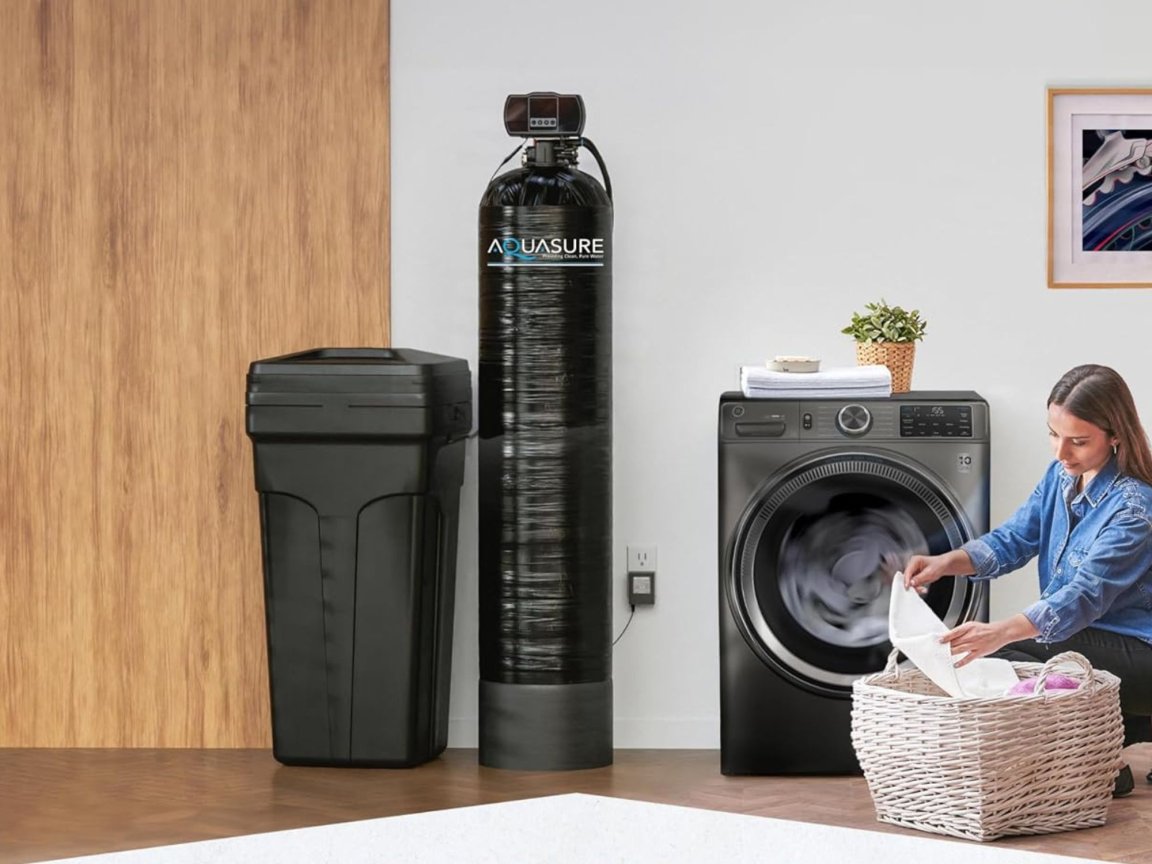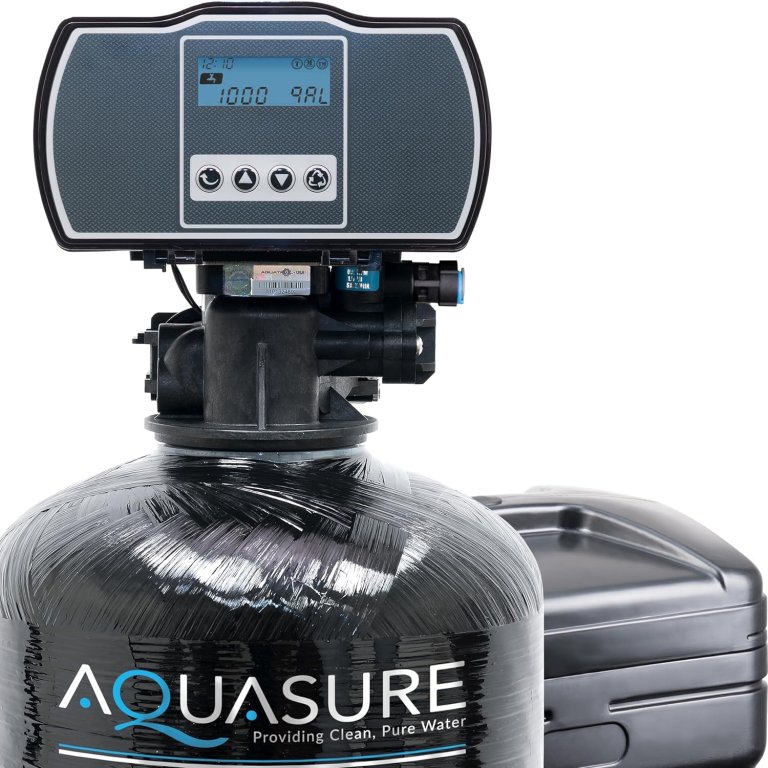We may earn revenue from the products available on this page and participate in affiliate programs. Learn More ›
A water softener for well water is fitted to a plumbing system to filter unwanted minerals out of hard water. This prevents the buildup of scale that can clog pipework and reduce the working life of household appliances like washing machines and dishwashers. One typical sign of excess hard water is white deposits in showerheads. City water can also be hard, which explains the need for a variety of different water softener systems.
There are a number of important technical aspects to consider when choosing the right hard water treatment for your home, and we explain these in detail in this article. We have also included our recommendations for what we believe are currently the best water softeners for well water on the market.
Best Overall
Aquasure Harmony Series 48,000 Grains Whole House Water Softener
See ItPros
- High-capacity softener at a competitive price
- Multi-function digital control head
- Heavy-duty corrosion-resistant tank
Cons
- Requires considerable floor space
- Faults aren’t common but do occur
Specs
- Type Salt-based, dual tank
- Grain Size 48,000
- Suitability Up to 5 people, 3 to 4 bathrooms
Aquasure has been developing water softeners for over 25 years. This model from the Harmony Series is designed to work with both city and well water. It is a dual tank system, which is usually recommended for well water, with a 48,000 grain capacity. This will deliver softened water for families of up to five in homes with three or four bathrooms.
A digital control pane clearly indicates the flow rate and time left until regeneration is recommended. The intuitive control head can be programmed to maximize efficiency based on the household’s water usage. Installation is straightforward, and a heavy-duty polyethylene tank with a fiberglass lining provides excellent corrosion resistance and durability. Models ranging from 30,000 to 72,000 grains are also available.
Get the Aquasure water softener for well water at Amazon, Lowe’s, or The Home Depot.
More Water Softeners for Well Water Worth Your Money

Our best rated water softener will satisfy many buyers, but there are always exceptions. The following options cover a range of prices and specifications to suit different-sized homes and families.
- AO Smith Whole House Descaler System, available at Amazon or Lowe’s.
- Aquasana Whole House Well Water Filter System, available at Amazon.
- Whirlpool 40,000 Grain Softener, available at Amazon.
- Durawater Fleck Whole House Water Softener, available at Amazon.
- Pro+Aqua 80,000 Grain Whole House Water Softener, available at The Home Depot or Amazon.
How We Chose the Best Water Softeners for Well Water
Finding a water softener system for homes with well water is more challenging than for those that use city or municipal supplies, but because there are fewer options, it allowed us to research the market in depth. We looked at each of the technical aspects discussed below and also considered ease of installation, durability, any maintenance requirements, and price.
We also took expert advice. John Wilson, CEO of Wilson Plumbing and Heating, told us that finding out your well water’s hardness was a good idea. You can check typical hardness in your zip code at sites online, but testing your well water is better, and kits are widely available. Deciding which type of water softener you need is key: “Salt-based systems are generally more effective for treating hard water, while salt-free options are ideal if you want to avoid salt altogether.” Choosing the correct size for your household needs is important because an under-specified model will actually be more expensive to run. He also said to “look for a model that’s easy to maintain, with infrequent salt refills and minimal upkeep.”
What to Consider When Choosing a Water Softener for Well Water
One of the main benefits of water softener use is the reduction of scale, something we discuss in detail in our article “So you want to install a water softener.” Doing so can increase the life of appliances, reduce the amounts of detergents and soaps you use, and improve how your skin and hair feel. Once you have identified the problem and decided a water softener for your well water is the right course of action, you’ll want to think about the following features.
Types of Water Softeners
There are basically two water softener types: those that use salt and those that are salt-free. Salt-based models work on the ion exchange principle and have a brine tank and a resin tank. The resin has negatively charged ions that draw the minerals with positive ions, which cause hardness, out of the water. These negative ions need to be replenished, hence the use of salt water for the brine tank. The softener manufacturer may recommend a brand of water softener salts, but there are numerous other options to choose from as well.
Salt-free systems use an electromagnetic system that causes minerals like calcium and magnesium to crystallize so they don’t form scale in your plumbing or appliances. They are cheaper but only effective with low hardness, so they’re not generally recommended for well water.
Capacity
Water softener capacity is measured in grains per gallon (gpg), though usually just the term grains is used. Technically speaking, 1 grain equals 0.002 ounces of calcium carbonate dissolved in a gallon of water. Water with a gpg of 7.5 and above is considered hard.
To calculate the grains you need, you should multiply your water hardness by the average daily water consumption. Aquasure, who manufactures our top pick, gives the following guide.
32,000 grains is enough for 1-3 people and 1-2 bathrooms.
48,000 grains is enough for 4-5 people and 3-4 bathrooms.
64,000 grains is enough for 5-7 people and 5-6 bathrooms.
72,000 grains is enough for 7+ people and 6+ bathrooms.
Installation
There are two things to consider when it comes to installation: the space available and whether to tackle the job yourself. Salt-based water softeners for well water have two tanks, one for resin and another for the brine (salt water) necessary for regeneration. These can take up considerable space. The optimum position is as near the water’s entry point to the home as possible, so the size of the tanks may have an impact on your choice. It is possible to install an outdoor water softener, and some are available with weather covers, but bear in mind it still needs an electrical supply.
While the plumbing fixtures for water softeners are fairly straightforward, the process of installation may not be. Understandably, many people prefer to have installation carried out by a professional.
FAQs
The information above applies to a variety of home water softening systems for those who have well water and will help you find the right model for your needs. During our research, we found several specific questions relating to water softening that crop up regularly, so we have answered those here.
A water softener is a system that reduces the amount of minerals in your water, generally called hard water. It reduces the build up of scale that can shorten the life of household appliances like water heaters, washing machines, and dishwashers.
A salt-based water softener works by adding resin beads to hard water in order to attract minerals that cause scale, like calcium and magnesium. A salt-free system uses electrolysis so the minerals pass through without adhering.
We’re happy to recommend any of the water softener brands mentioned in this article. Aquasure, which was our top pick, performs consistently well in independent reviews.
The main downside is the cost of a water softener. Annual water softener maintenance may also be required.
The longevity of a water softener will depend on the composition of the well water, but on average they can be expected to last 15 to 25 years. Our comprehensive article on how long water softeners last has more details.
It’s a personal choice, but a water softener will usually reduce hard water damage to plumbing fittings and appliances. You could also consider a well water filtration system that includes a water softener component.
A well water softener system should produce water that is safe to drink, but you can still get it tested by your local county or state-certified laboratories. Some people also add filtration to reduce sodium levels.
Salt-based water softeners do. The process is called ion exchange. It can remove calcium, magnesium, and iron.


